Looking over the best war movies ever made creates a fascinating trajectory of not only war, but of how we discuss such a controversial topic at the time of the film’s release. Platoon absolutely needed to come out in 1986. I’m not sure how well-received it would be today. These days, we’re pretty obsessed with the wars that may or may not happen. That includes the possibility of another Civil War, which makes it difficult for us to think about anything else.
Although it goes without saying that people are probably going to be obsessed with World War II forever. Some people would argue that was the last noble war America fought in. Others believe it was just as cruel and needless as any other conflict. Since Nazis are once again on the rise, there are people who wonder if there was any point to the Second World War at all. America killed Hitler, went shopping, and didn’t really worry about anything else.
Until the next war came along.
And as long as film has existed, we have had war films.
We frankly do not have time to study the relationship between war and war movies. They can be made for a plethora of reasons, from a need to come to grips with something atrocious and pointless, to pure propaganda that favors staggering heroism over grim realities. War lends itself well to film for a number of reasons. Some people just want to see a huge battle brilliantly recreated. You may use this list of the best war movies of all-time to come to a better understanding of this concept.
To be sure, every type of war movie is going to find a place on this chronological best war movies list.
Once more unto the breach, dear friends, once more.
The Best War Movies
1. All Quiet on the Western Front (1930)
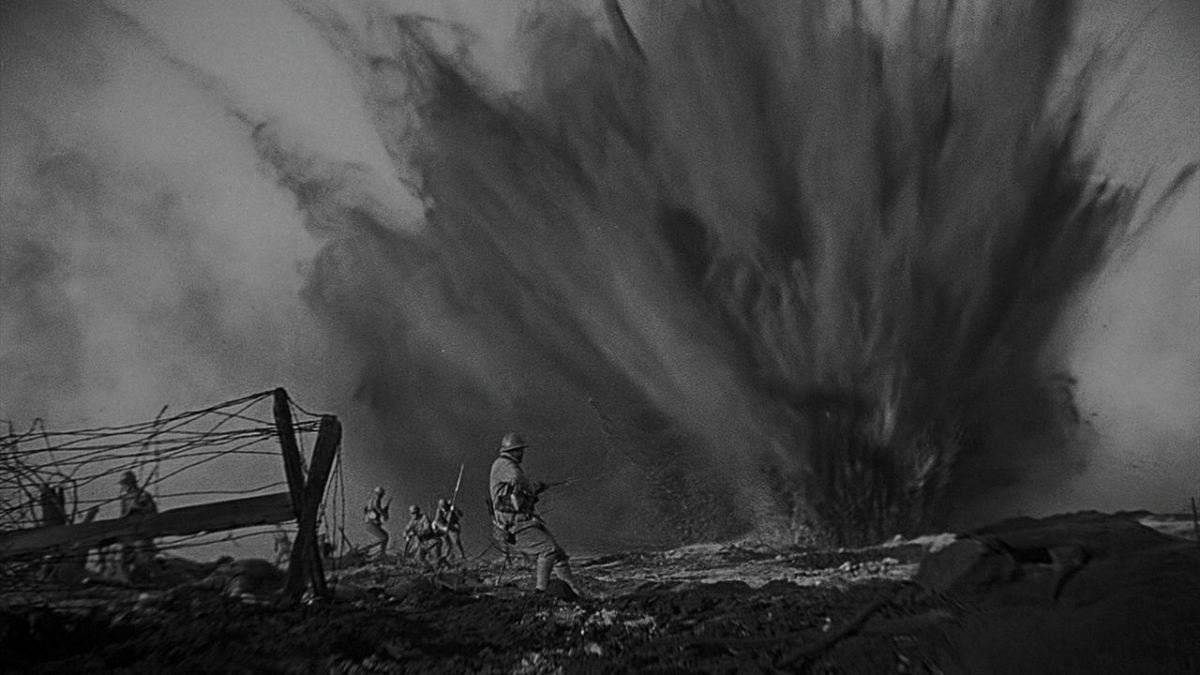
Director: Lewis Milestone
A big winner at the third Academy Awards ceremony, All Quiet on the Western Front can’t help but come across as dated to modern audiences. It is the fate of all movies to one degree or another. This is even true of a film such as this, which was the first war epic. Perhaps, it was also the first war movie to take characterization seriously.
Anyone can blow stuff up. It is much more challenging to create something that is harrowing, and yet somehow entertaining or engaging on grand, complex ideas. All Quiet on the Western Front still shines for its energy, and for humanizing soldiers on a scale that can be appreciated as ambitious. It still retains a good deal of its initial awe.
Watch if: You want to see a compelling piece of film history.
Avoid if: 2 and a half hours is a long time to devote to something like that.
2. The Grand Illusion (1938)
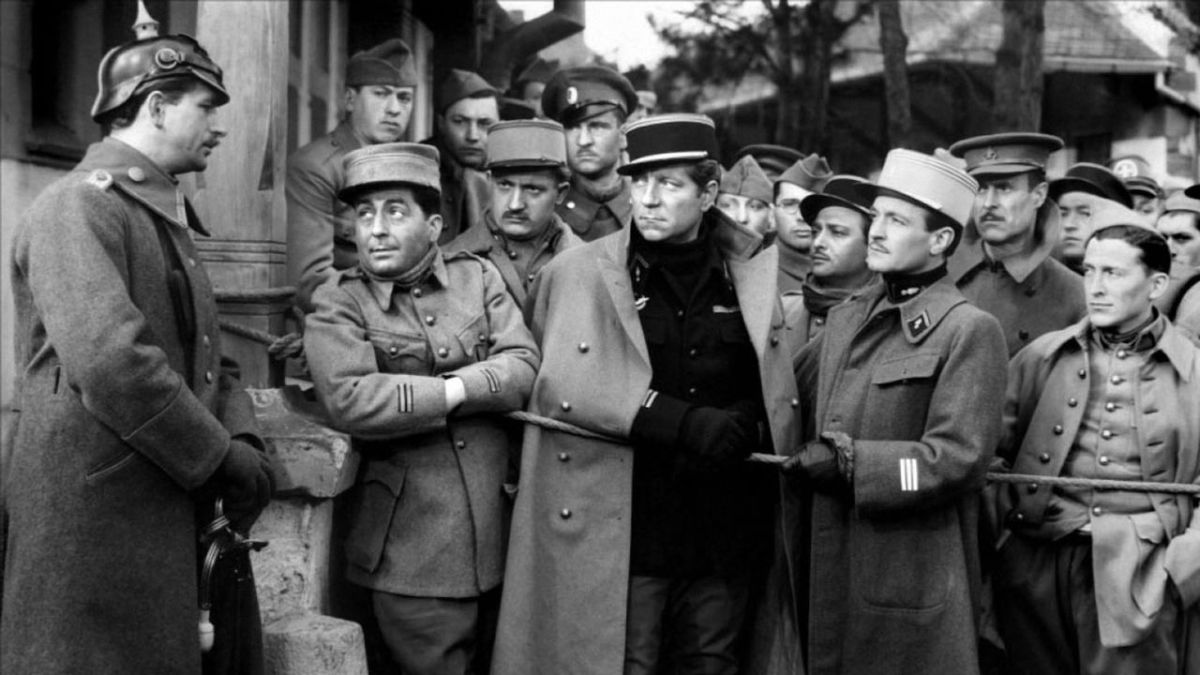
Director: Jean Renoir
In one of his best films, director Jean Renoir used this sprawling story of soldiers on various sides of the First World War to make sense of the chaos of his time. That would be the rise of fascism in Europe, which soon led to World War II.
The historical backdrop is significant, but The Grand Illusion Is still a humanist drama of the highest order. Effecting performances from cast members like Jean Gabin and Erich Von Stroheim (one of the great directors of the silent era) give The Grand Illusion a dramatic weight that it continues to retain.
Watch if: You want to see one of the best movies ever made about World War I.
Avoid if: You prefer war movies with a hefty slab of actual fighting.
3. The Best Years of Our Lives (1946)
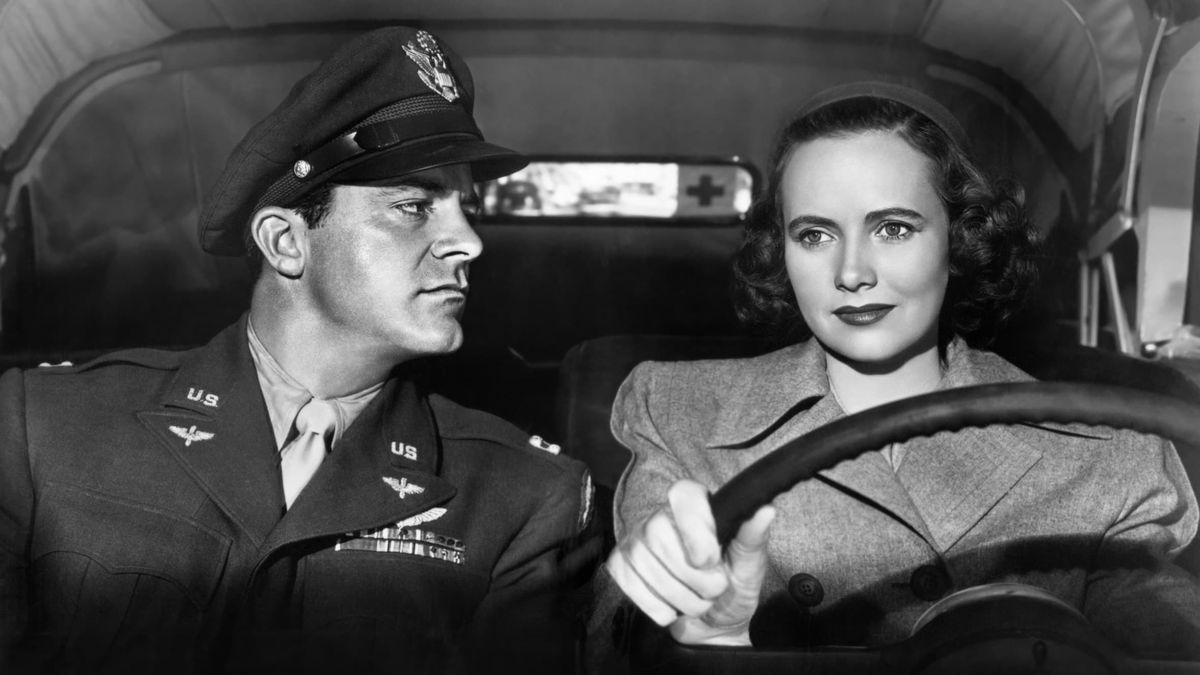
Director: William Wyler
William Wyler spent a long career directing large-scale human dramas. This film, one of the very first to make a serious attempt at examining post-war life for soldiers coming back from World War 2, remains one of his best. The Best Years of Our Lives is impressively timeless. Its vitality and depth of character and story are still apparent 75+ years.
The lack of glamor or posturing for awards are things you will definitely pick up during this classic from one of Hollywood’s most productive periods. There is something thoroughly sincere and unpretentious about this film. There is still a certain degree of stylization, to be sure, but it doesn’t stick out or overwhelm this film.
Led by an all-star cast, including Myrna Loy and Fredric March, The Best Years of Our Lives is old-school Hollywood at its best.
Watch if: You want an exceptional cast with a strong story.
Avoid if: You just can’t stand movies older than you are.
4. The Bridge on The River Kwai (1957)
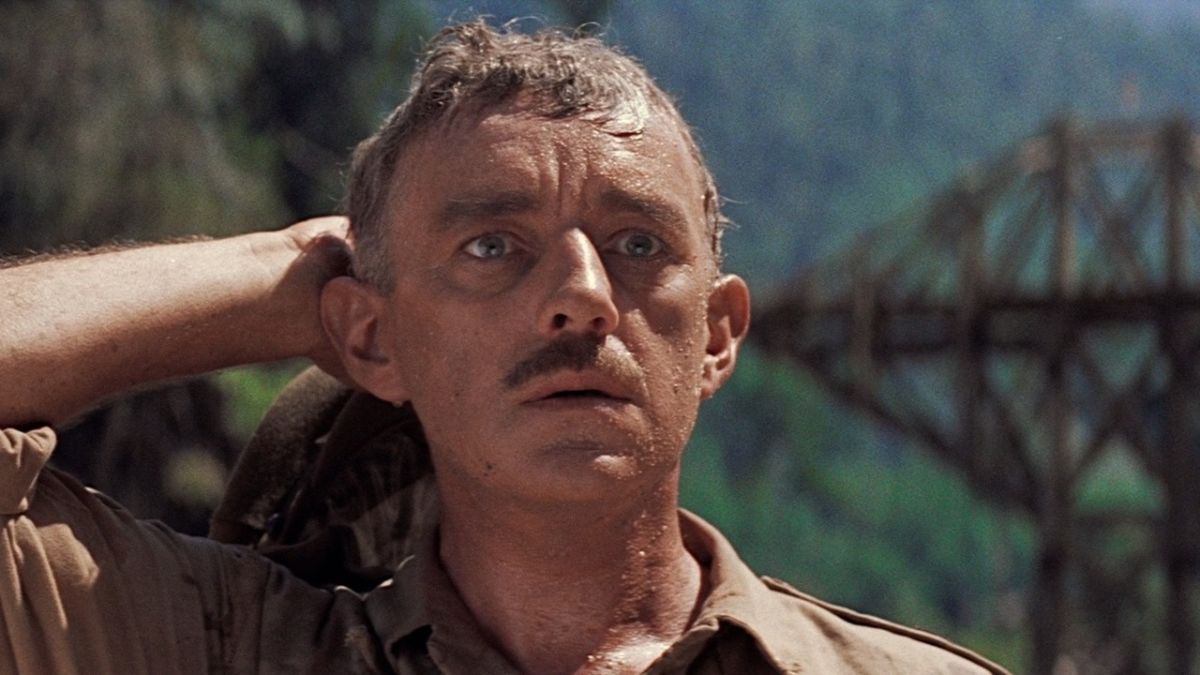
Director: David Lean
For me personally, many of the best war movies ever made are the ones that carve out character-driven stories from solitary moments in larger histories. The Bridge on the River Kwai remains one of the best examples of that approach to telling stories about world wars and other conflicts. The movie takes a number of liberties with the actual event, in which British POWs were forced by Japanese military to build a bridge during World War II, but that’s okay.
The Bridge on the River Kwai is more about the madness brought about by seemingly endless war and struggle, and the various relationships that are created within such dire circumstances. These messages are expressed in powerful performances by William Holden, Alec Guinness, and Sessue Hayakawa, and in the movie using every second of its lengthy running time to build to its flawless conclusion.
Watch if: You want to see a multifaceted bridge-building tutorial.
Avoid if: The idea of seeing Japanese actors playing wartime villains bores you to tears.
5. Paths of Glory (1957)
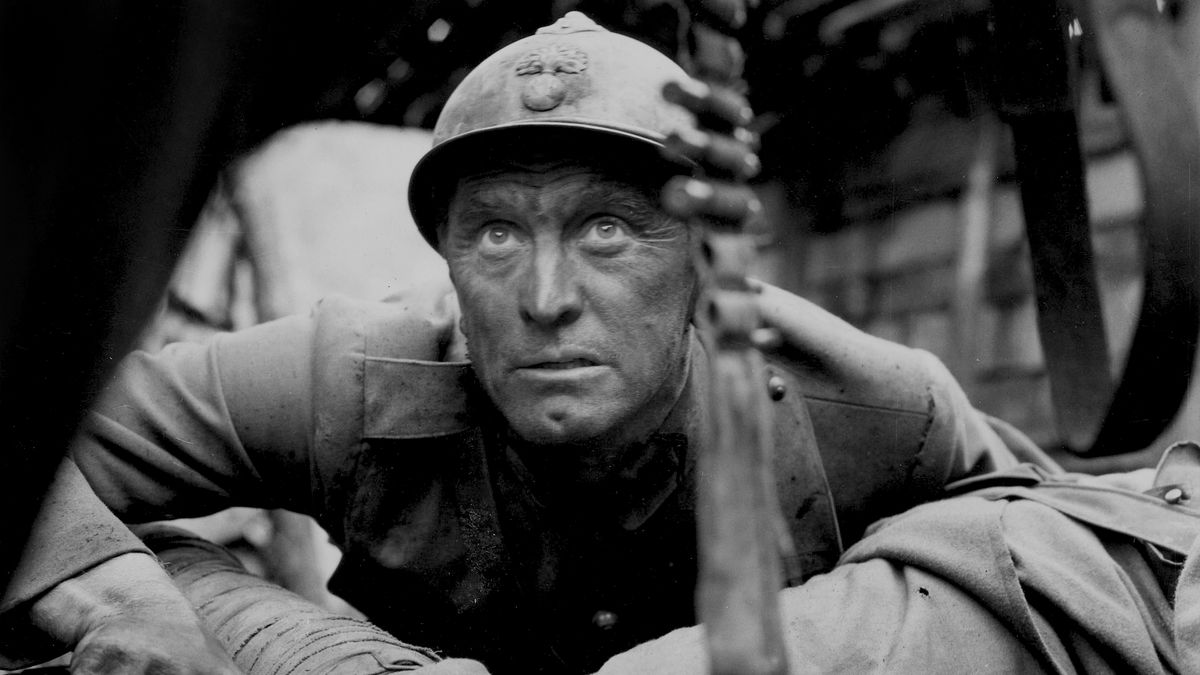
Director: Stanley Kubrick
Released on Christmas Day 1957, just 11 days after The Bridge on the River Kwai, Paths of Glory remains one of Stanley Kubrick’s most focused attacks on the absurdities of war. Paths of Glory details three men who are railroaded with bogus charges, as a means of saving face for a higher-ranking officer.
The movie is remembered in the present a magnetic performance by Kirk Douglas. Yet the strongest thread in this decidedly antiwar movie is the idea of accountability. It paints a somber portrait of the depths people sink to when faced with a conflict that swallows their souls from top to bottom.
Watch if: You want to see something as depressing and cold as war itself can be.
Avoid if: You need heroes in your war movies.
6. The Battle of Algiers (1966)
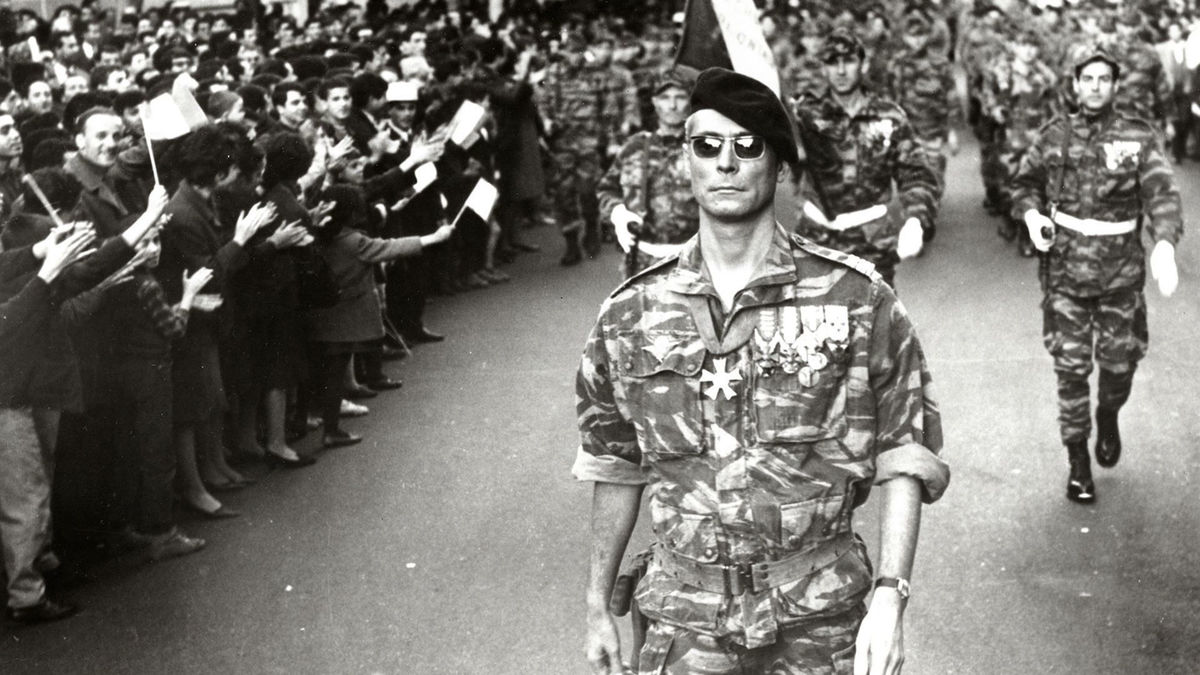
Director: Gillo Pontecorvo
Focusing on rebels in the Algerian War, fighting against the presence of the French government in North Africa, The Battle of Algiers is decidedly bleak.
This is even in the context of the best war movies. At the time of its release, directed by Gillo Pontecorvo, it was to date the most ambitious attempt to recreate the concepts and unique terrors of guerilla warfare. It succeeded in this, while also highlighting moving performances by Jean Martin and Saadi Yacef.
The focus on actual warfare conditions and demands, combined with a cutting score by Pontecorvo and Ennio Morricone, makes The Battle of Algiers essential viewing for those who want war depicted in the least glamorous conditions possible.
Watch if: You want to see a fast-paced, well-acted, and decidedly intense war film.
Avoid if: You prefer war stories with a stronger focus on the human condition in such deplorable situations.
7. The Dirty Dozen (1967)
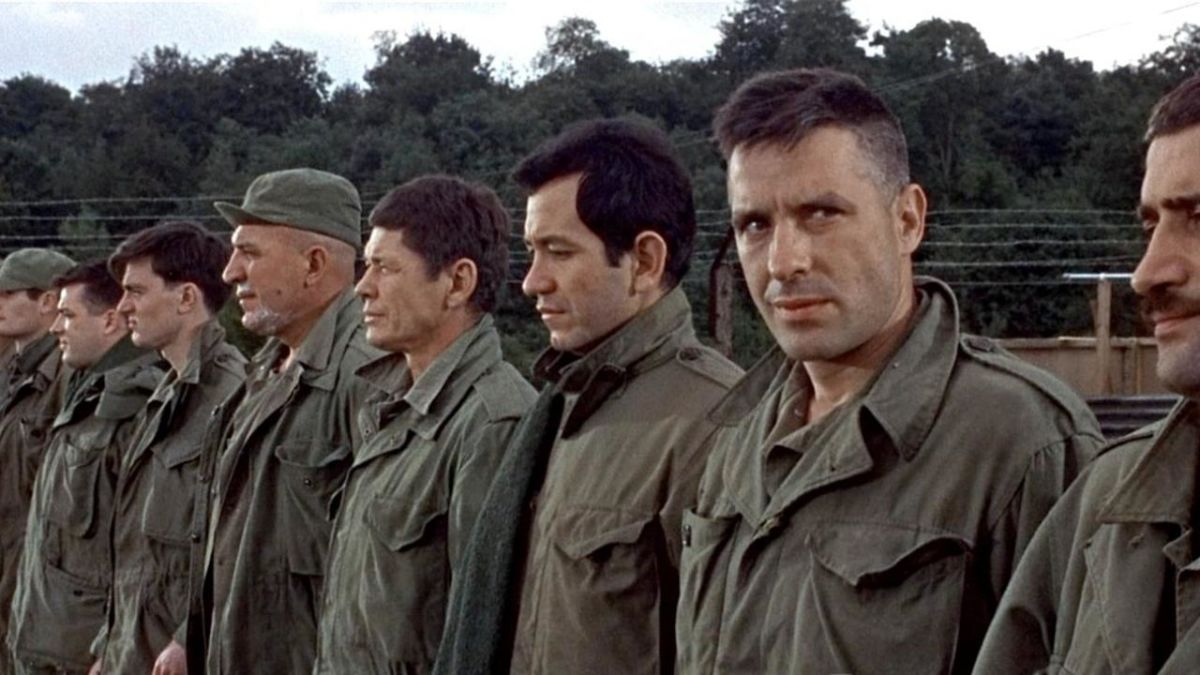
Director: Robert Aldrich
Few entries on this list make war seem like a good time. The Dirty Dozen is so relentlessly, cheerfully chaotic, gathering a large cast of likable actors (Lee Marvin, Jim Brown, Donald Sutherland, John Cassavetes, and others) to kill as many Nazis as humanly possible.
There is a straightforward appeal in that. There are lots and lots (and lots) of movies in the vein of this one, which was directed by the great Robert Aldrich. Few of them have the aplomb and style of The Dirty Dozen.
Watch if: You just want to see a bunch of guys mess up some Nazi scumbags.
Avoid if: You’re beyond such things.
8. Patton (1970)
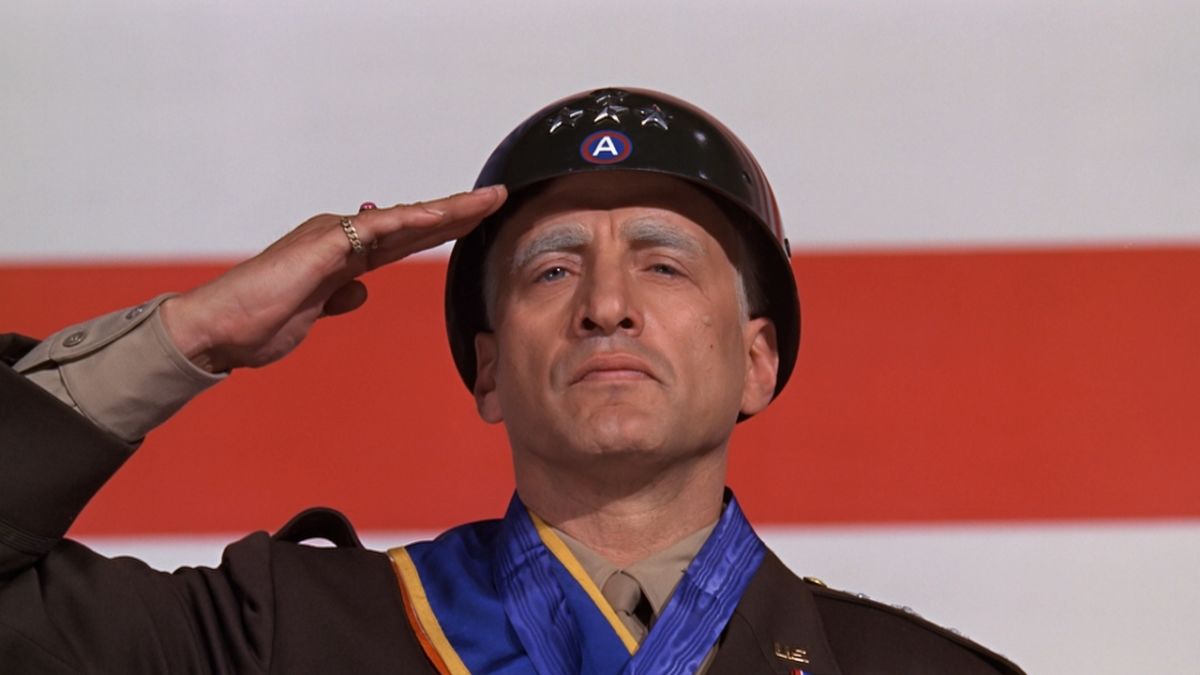
Director: Franklin J. Schaffner
George C. Scott famously turned down the Best Actor Oscar he received for playing controversial World War II general George S. Patton. That gesture alone emphasizes why Scott’s portrayal of Patton remains one of the most celebrated film performances of all time.
The movie mythologizes Patton, perhaps more than some will be able to stand, but it also provides insight into the deeply intimidating prospect of a man with a definitively singular purpose. Patton’s approach to war could be described as thrilling by some. Others would call it sad, or perhaps even terrifying. George C. Scott’s performance suggest all three, creating a vital portrait of one of the most noted figures in American military history.
Watch if: You want to see a fascinating depiction of a fascinating, terribly flawed man.
Avoid if: You don’t like war movies with controversial figures presented in heroic terms.
9. M*A*S*H (1970)
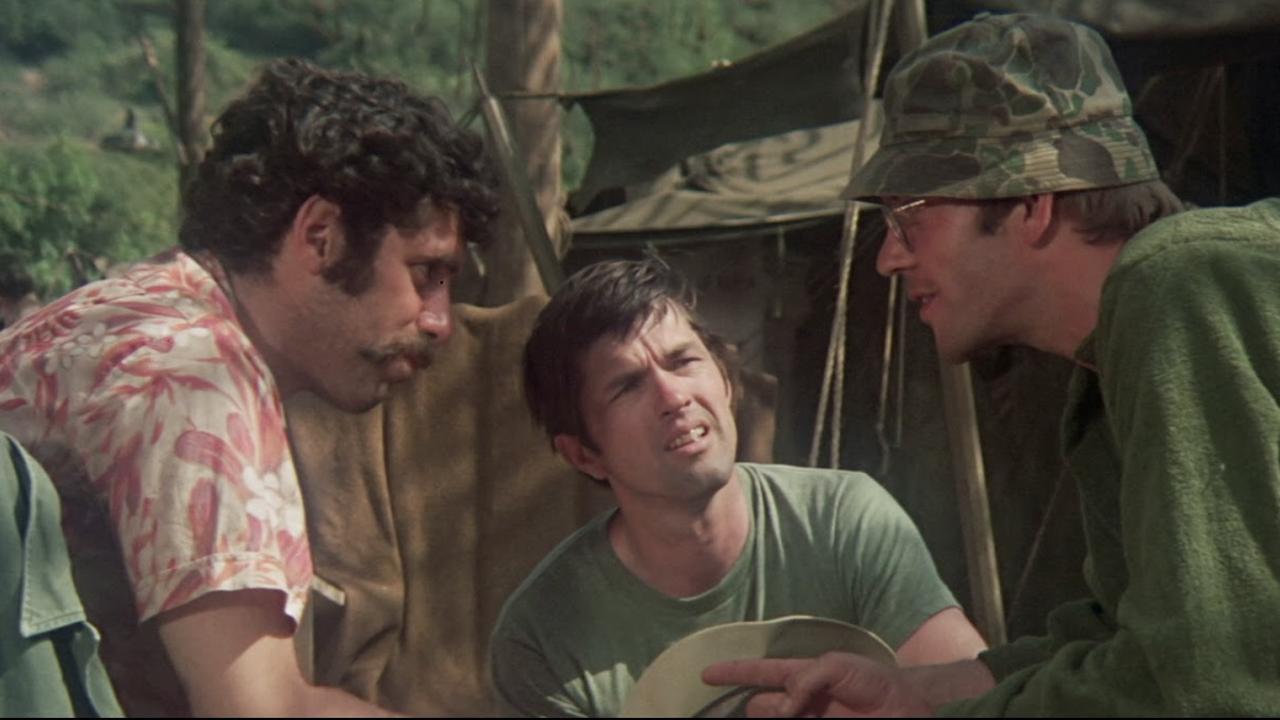
Director: Robert Altman
The anti-war ideas often associated with M*A*S*H belong more to the considerably-more-famous TV show that came out of film.
Robert Altman’s 1970 ensemble comedy has a lot to say about the futility of the concept, but the real teeth of the movie are used on the various components of the industrial-military complex. The paperwork attitudes of those who send individuals like Hawkeye, Duke, Trapper John, and Hot Lips into hellish combat zones in the first place.
The movie is so freewheeling in its pace and overall energy, it’s easy to lose track of what it’s all supposed to be about. If M*A*S*H isn’t about anything meaningful, then at least it rests well on deranged men making the most of a bad situation.
Watch if: You like comedies that can be appreciated in a number of different ways.
Avoid if: There’s a Black character named Spearchucker (played by the legendary Fred Williamson). You should probably just decide now if you’re going to be okay with that.
10. The Deer Hunter (1978)
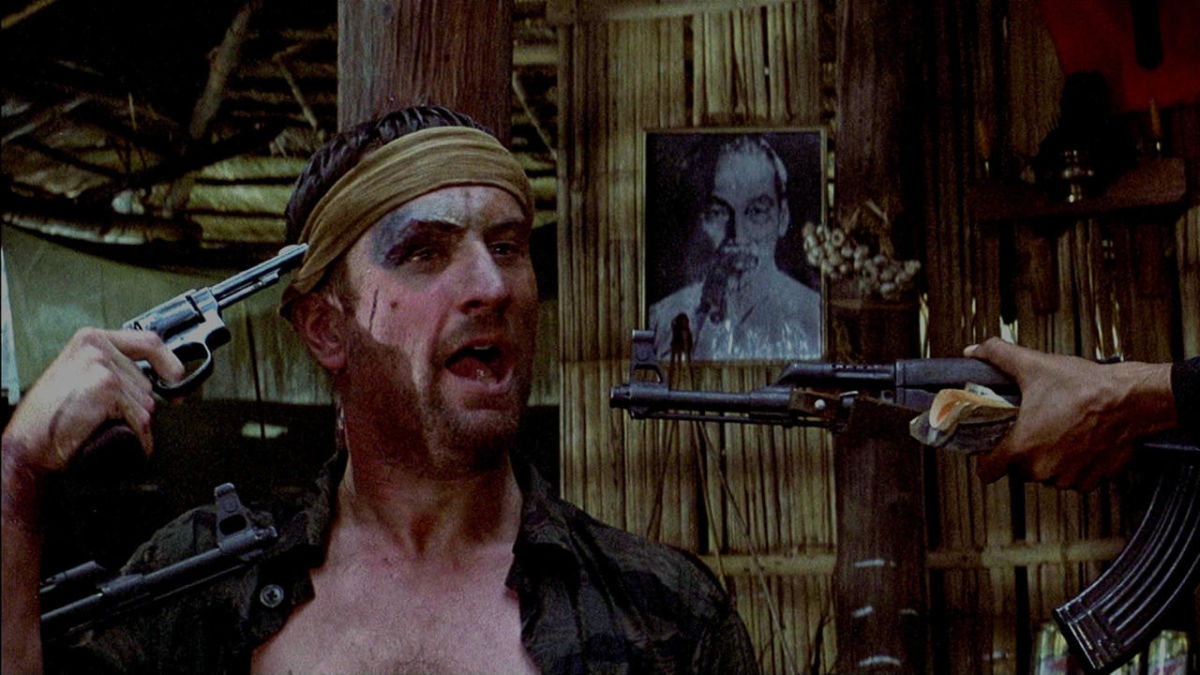
Director: Michael Cimino
Christopher Walken, who figures prominently in the movie’s most iconic scene, won an Academy Award for his portrayal of a Pennsylvania steel worker who is changed forever by his experiences during the Vietnam War.
The politics of The Deer Hunter, which features amazing performances from Meryl Streep (nominated for her first Oscar, and then we never heard from her again), Robert De Niro, and John Cazale (his final performance), have been heavily debated for years. It doesn’t help the debate that no one can even agree on who wrote what in the film’s massive screenplay.
The Deer Hunter showcases bleak futures under the specter of not only one war or another, but also the rituals of our surroundings.
Watch if: You like movies packed with good performances.
Avoid if: You have a romantic impression of the game Russian Roulette.
11. The Tin Drum (1979)
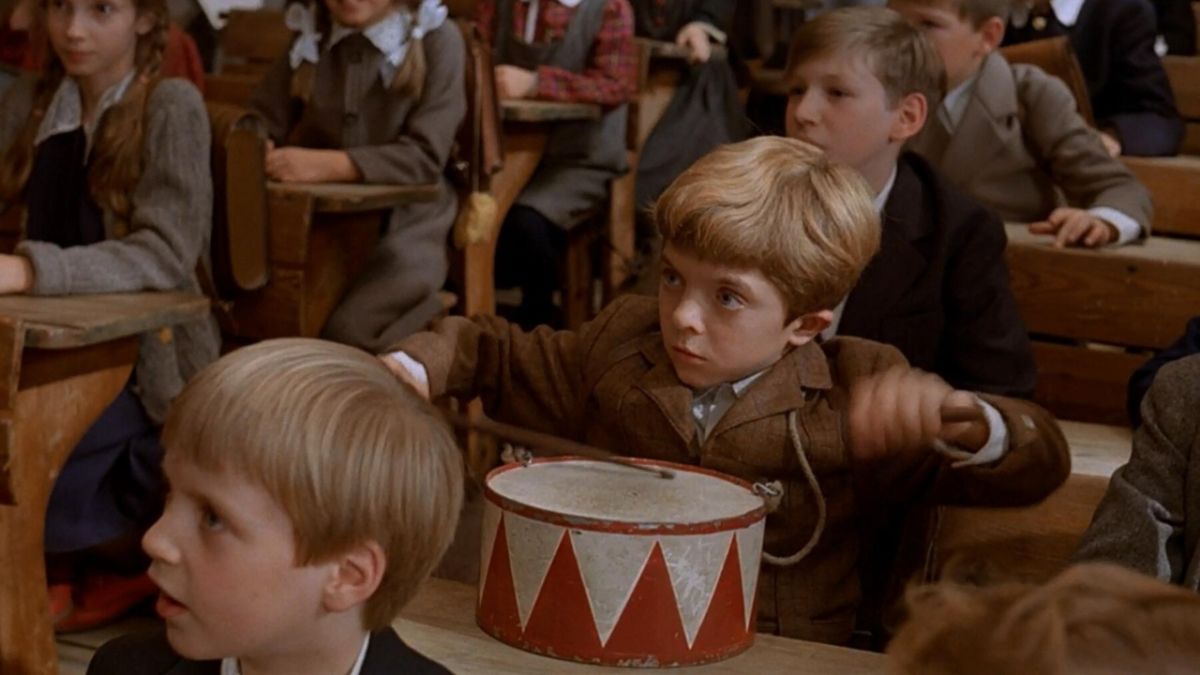
Director: Volker Schlöndorff
This might be the controversial choice on this list. I’ll argue the merits of this deranged, endlessly fascinating war drama until the end of the time, or the start of World War III.
The Tin Drum is a German film based on a novel by Günter Grass. It was directed and cowritten by Volker Schlöndorff. Although Schlöndorff is still directing good stuff to this day, The Tin Drum is probably his masterpiece. There is something about the tone of this movie, in which a young boy’s obsession with a tin drum carries him through World War II and beyond, in which everything seems to be building to a conclusion that will scorch the earth.
There is something absolutely insane and desperate about this film, which is also one of the weirdest World War II movies ever made.
Watch if: You like surrealism and absurdity more than just about anything.
Avoid if: You like surrealism and absurdity, but only when those things make sense.
12. Apocalypse Now (1979)
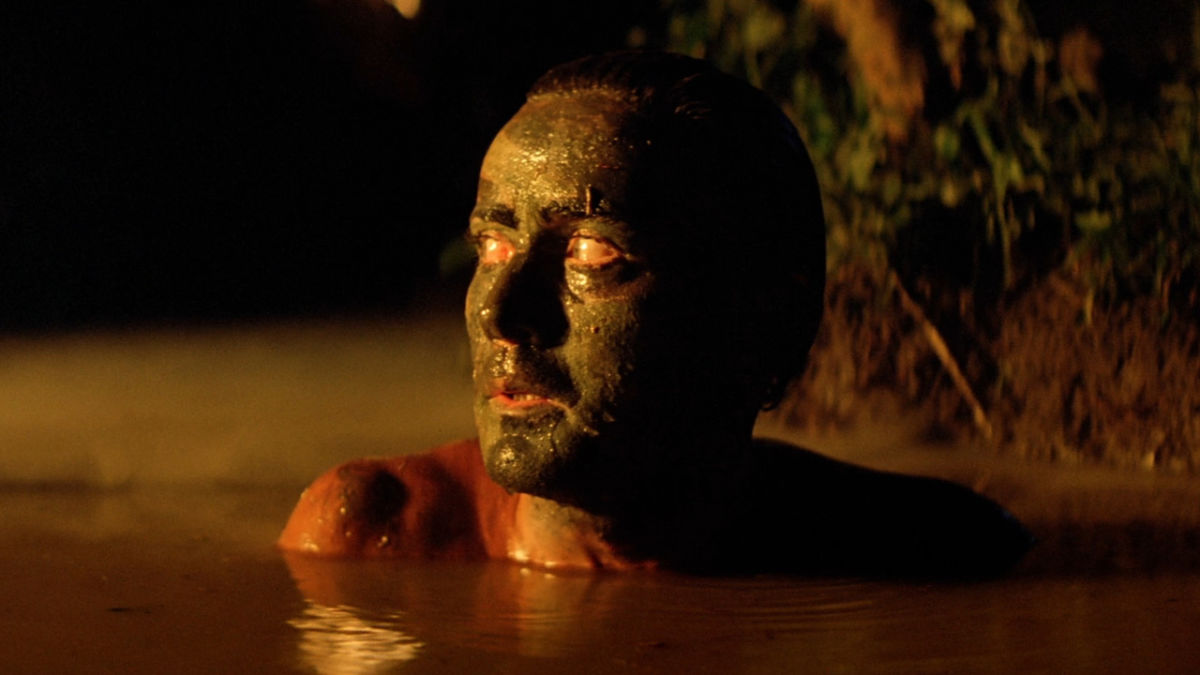
Director: Francis Ford Coppola
One of the best things about Francis Ford Coppola’s Vietnam epic Apocalypse Now is the fact that it’s appreciated by so many different groups of people.
Some appreciate the connections shared between the novella Heart of Darkness and this story of an army captain (Martin Sheen, in one of his best) tasked with an increasingly unstable mission to take out a U.S. colonel who has gone insane. Others claim this movie makes one appreciate the various facets of war like no other. Others still focus on how this rambling, lengthy (2 ½ hours) story manages to maintain such a blistering focus on dissecting everything possible about the Vietnam War.
Personally? I’m always fascinated by the choices people make in relentlessly perilous situations.
Watch if: You want to see a fever dream that doesn’t let up for even a second.
Avoid if: Excess in filmmaking bothers you.
13. Gallipoli (1981)
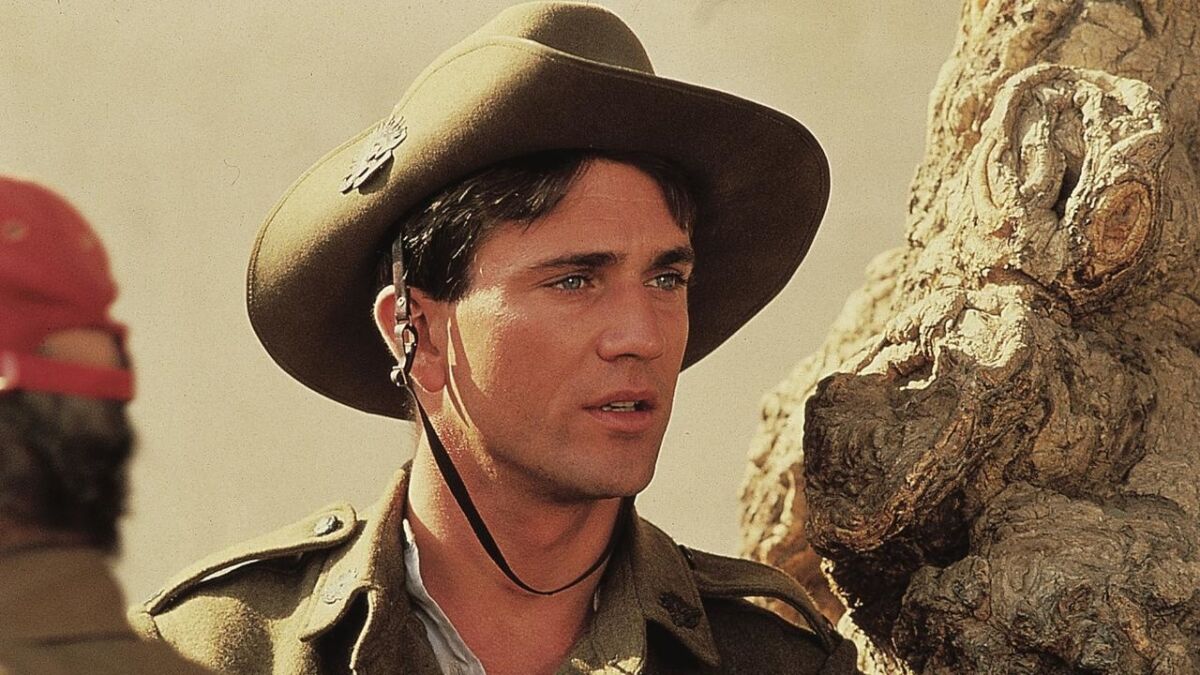
Director: Peter Weir
Australia’s seminal film on the First World War is one of the best from Peter Weir, director of such films as Picnic at Hanging Rock and Witness. The movie is a towering epic of one of the bloodiest and most chaotic events of the early 20th century. Yet it is also grounded very successfully in its study of the men who are forced to contend with these circumstances.
Gallipoli is a visually spectacular war movie, to be sure. However, where the film is particularly successful is in how it presents war as a remarkable, but ultimately horrendous force of nature. It sweeps up lives, communities, entire universes of dreams and ambition. For most, war lays these dreams to utter waste. This is the journey we go on with two young men, played by Mel Gibson and Mark Lee.
Their journey makes for one of the best war movies of all time. This is a decidedly cinematic effort that simultaneously avoids glamorization for the most part.
Watch if: You want to see a powerful, far-reaching story of war shaping human destiny.
Avoid if: You’re not up for anything with Mel Gibson in the cast (and that’s fair).
14. Come and See (1985)
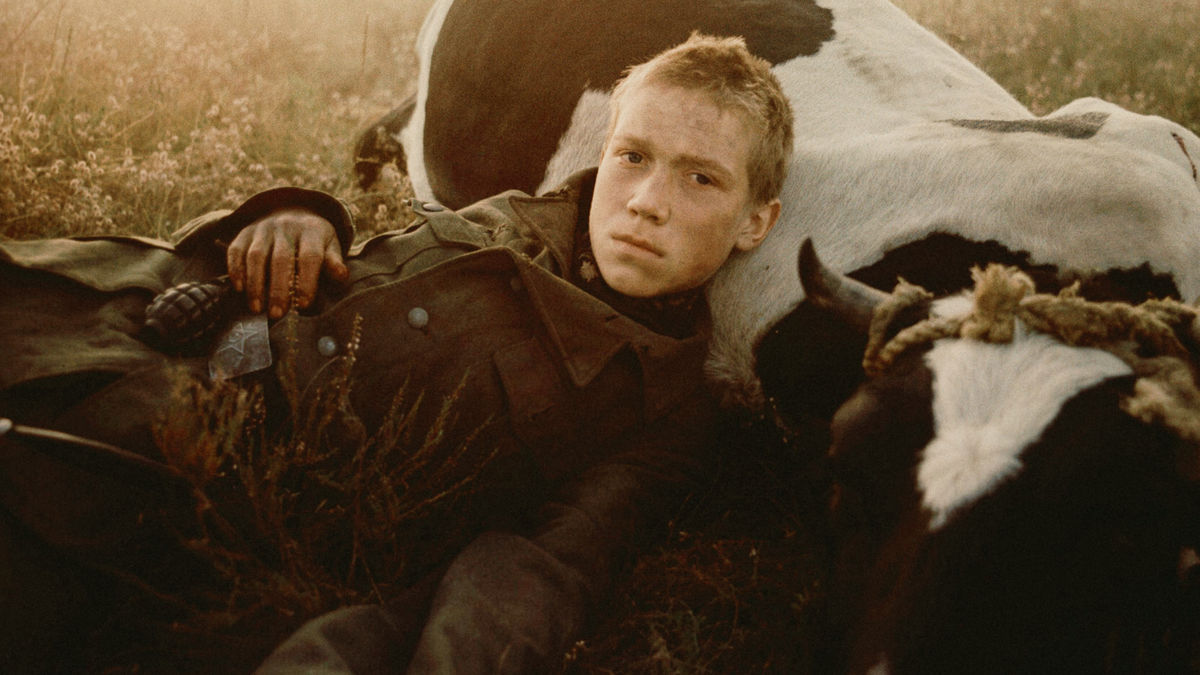
Director: Elem Klimov
There is something ominous about this seemingly simplistic title, which was based on a 1978 book called I Am from the Fiery Village. If you have that suspicion, you won’t have to wait long for this film, directed by Elem Klimov (who cowrote the screenplay), to prove it so. Come and See is to witness a film that captures despair with an attention to natural-seeming detail that is generally reserved for documentaries.
Yet Come and See is very much a stylized narrative film. The story has German forces invading a Byelorussia village, which prompts a young man (Aleksey Kravchenko) to join up with the crumbling resistance. Scenes of the young man meeting a girl (Olga Mironova) eventually give way to the village being absolutely decimated. The film then pulls a cruel focus on Kravchenko, pitting his tragically unprepared youth for some of the very worst of what war has to offer.
It is one of the most haunting war films ever made, particularly its despairing conclusion.
Watch if: You want to see one of the most powerful World War II films ever made.
Avoid if: You prefer World War II movies to be a little more glamorous.
15. Platoon (1986)
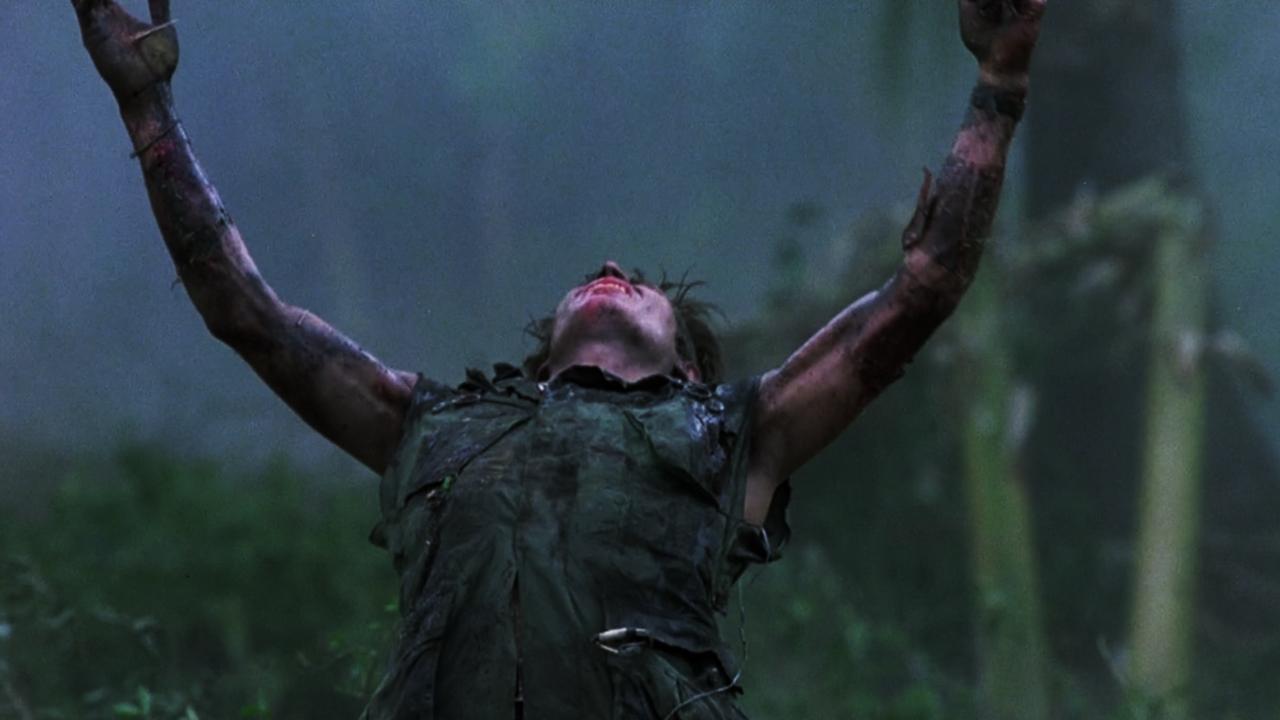
Director: Oliver Stone
Drawn from writer/director Oliver Stone’s own Vietnam experiences, American-made anti-war movies usually don’t have quite this much focused rage at its subject, which simultaneously breaks off into several compelling directions.
This movie has plenty of time and energy to discuss a very specific viewpoint on Vietnam — whether or not you agree with it.
Without blinking, or sacrificing anything, Platoon also highlights the insanity that can befall decent human beings, and the spectacular cruelty that is formed by the hands of men who were evil before they ever set foot in the jungle. Platoon also boasts career-defining performances from Tom Berenger, Willem Dafoe, Keith David, and former good actor Charlie Sheen.
Watch if: You want to see a distinct, uncompromising view of Vietnam, and of war in general.
Avoid if: You’re still pretty sure America won, or you know you won’t contend with Stone’s opinion on or depiction of the subject.
16. Good Morning, Vietnam (1987)
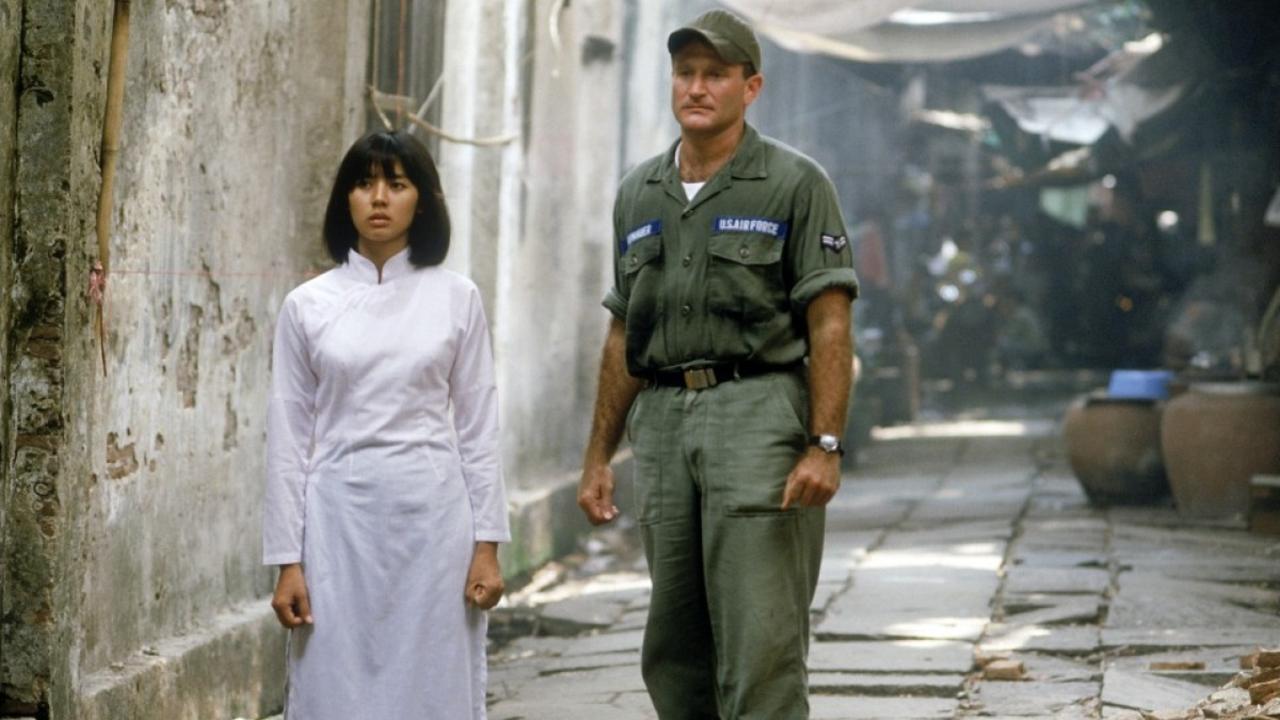
Director: Barry Levinson
Although extremely inaccurate in its depiction of Adrian Cronauer, an army radio DJ who entertained troops during the Vietnam War (that’s pretty much it), Good Morning, Vietnam is nonetheless one of the best Robin Williams movies of all time.
At the same time, it is also a pretty good anti-war movie, although it doesn’t go nearly as deep into the horrors of this war as Platoon or Full Metal Jacket. Good Morning Vietnam makes the wise mood of letting Robin Williams not only define Adrian as he sees fit, but also in terms of how his performance sets the tone for the rest of this movie. He also got to work with a very good supporting cast, including Bruno Kirby, Forest Whittaker, Chintara Sukapatana, J.T. Walsh, and Robert Wuhl.
Good Morning, Vietnam is also notable for being a Vietnam story that actually makes an effort to depict the region and its people accurately. While not perfect, there is a profound humanist approach to this film that really works to its favor.
Watch if: You want to see Robin Williams in one of his best.
Avoid if: You don’t think there’s anything even remotely funny about the Vietnam War.
17. Richard III (1995)
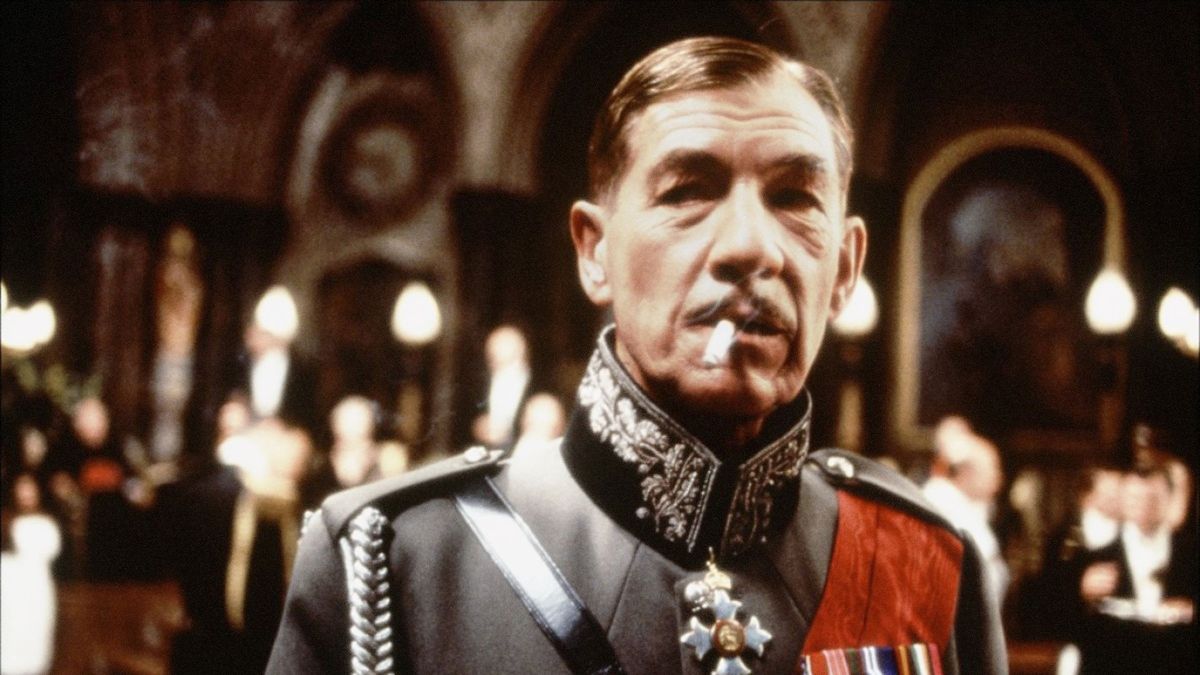
Director: Richard Loncraine
It just makes sense to set a story like Shakespeare’s Richard III in 1930s England. The script itself retains everything meaningful about the original play. It just also emphasizes again and again that these words and characters, most of whom are only loosely based on the actual people, can flourish amid period piece cocktail parties and ravaged 20th century battlefields.
Beyond amazing performances by Ian McKellen, Annette Bening, Jim Broadbent, Maggie Smith, Robert Downey Jr, Nigel Hawthorne and others, Richard III tells this grand story of evil with as much passion and creativity as you could ever want from a unique approach to an iconic stage play.
As a war film, chaotic scenes of battle, featuring such lines as “My kingdom for a horse!” (while inside a jeep besieged by explosions), are treated with inevitability and spectacle. It’s a curious mix, to be sure.
Watch if: You want to see Ian McKellen playing one of literature’s greatest villains, while the war machines of the early 20th century rage on.
Avoid if: You either hate Shakespeare. Or you love him way too much.
18. Saving Private Ryan (1998)
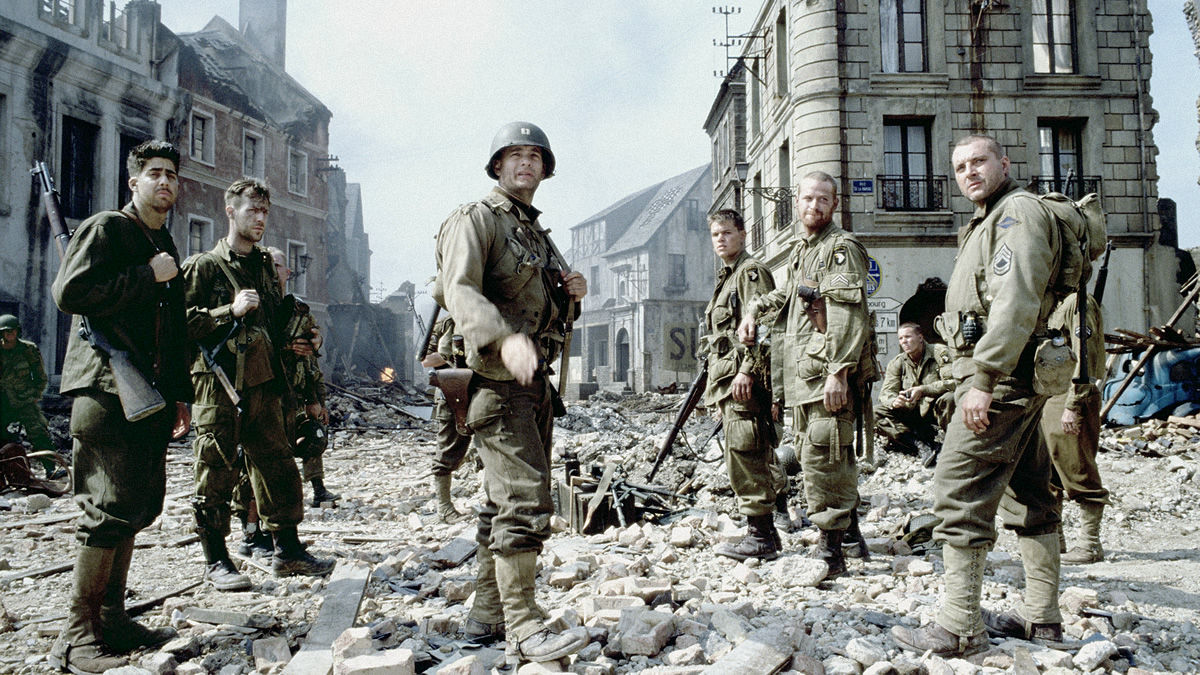
Director: Steven Spielberg
Actually, I was wrong. As far as I’m concerned, this might be the most controversial choice for best war movies. Mostly for the fact that after the first 27 minutes of Saving Private Ryan, it is highly debatable that Steven Spielberg’s World War II marathon is worth watching after that. At 169 minutes, I’ll leave it up to you to decide.
Performances from Tom Hanks, Tom Sizemore, and Matt Damon range from good-to-great, but everything pales in comparison to those first 27 minutes. Those are the moments in which Spielberg recreates the landing at Omaha Beach, part of the Normandy Invasion, with such overwhelming attention to detail that you will probably forget to blink.
That might be a good way to describe Spielberg as a director in general. When he’s good, it’s on a level that makes you willing to sit through 142 minutes of hit-or-miss Oscar bait dramatics.
Then again, I know a lot of people who like the entire film. You might be one of them.
Watch if: You want to see the most intense depiction of D-Day at Normandy that anyone will ever commit to a fictional film.
Avoid if: You have a low threshold for Steven Spielberg movies.
19. Black Hawk Down (2001)
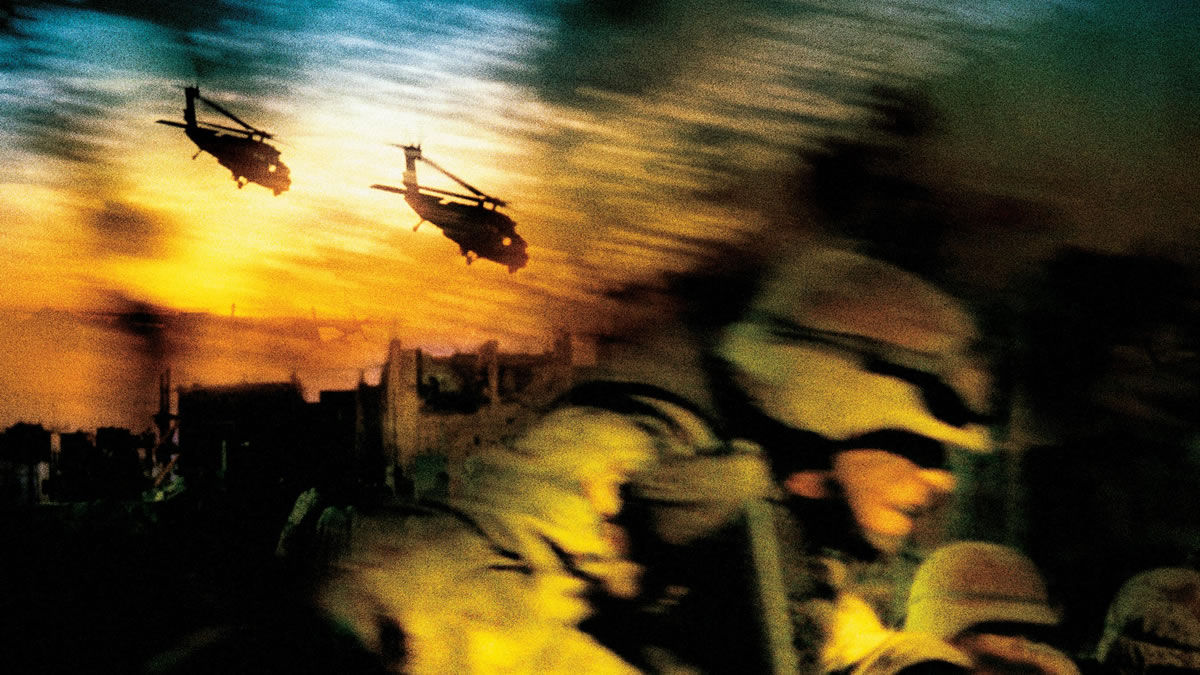
Director: Ridley Scott
Ridley Scott has been making viscerally engaging, relentlessly intense movies for a long time now. They don’t always work. Most of them are still at least interesting. A few of them are arguably classics of tension, ensemble cast balancing, pacing, and action. Black Hawk Down hits all of those marks.
Based on a 1999 nonfiction book about a 1993 U.S. military in Mogadishu, Scott’s film definitely takes a wide range of creative liberties, some of which have been interpreted as racist.
Unless you are a true stickler for realism in your war movies, I would strongly suggest at least watching the movie. It is a fascinating attempt to mythologize war, while trying to express it in realistic terms at the same time. The combination of these elements in Black Hawk Down is wholly unique.
If nothing else, the movie is going to get a strong reaction from you.
Watch if: You want to see a pretty exciting war movie, packed with a huge ensemble cast.
Avoid if: You’re sick of war movies that take needless liberties with the source material.
20. Pan’s Labyrinth (2006)
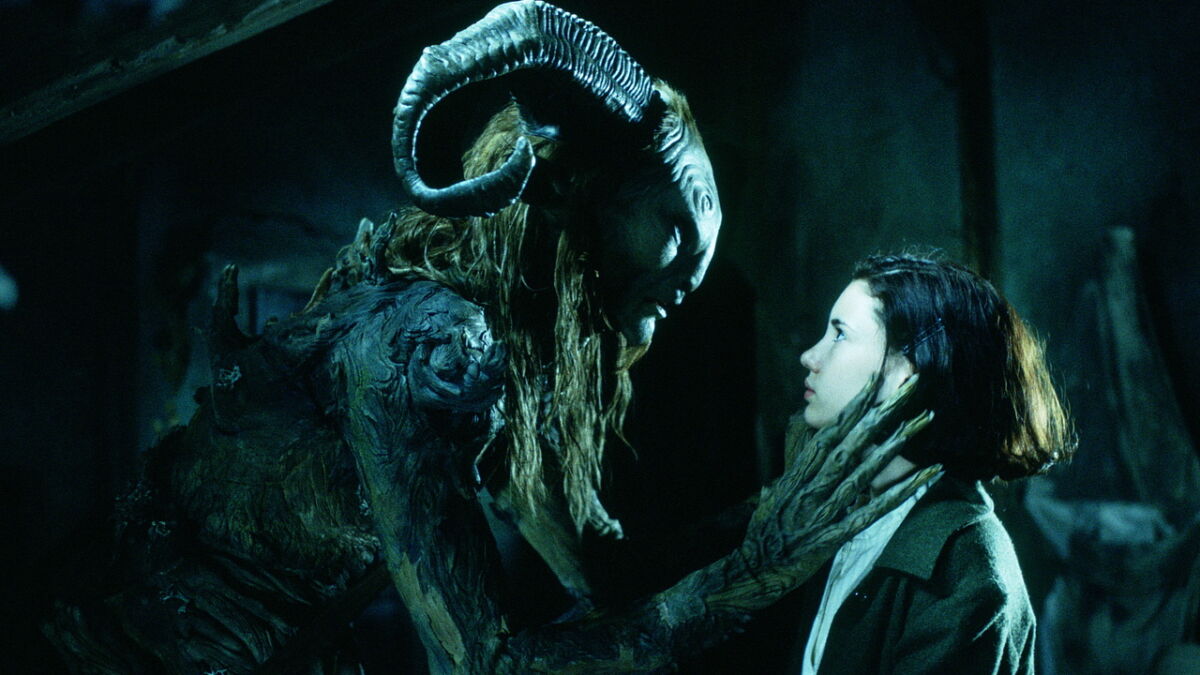
Director: Guillermo del Toro
Pan’s Labyrinth is such a visual wonder, both in special effects and in makeup. You may occasionally forget that this story of a young girl finding a portal to a fantasy world, buried in a crumbling, isolated mansion in Spain is in fact a war movie. War is a significant part of the plot, but it also exists as a constant part of the atmosphere.
Indeed, as we contrast between the bleakness of young Ofelia’s reality with the bizarre dream world in which she finds herself increasingly drawn to, we see how brutality and senseless cruelty, combined with fascism, can shape everything a child sees, hears, and ultimately feels. Pan’s Labyrinth is very much a war movie, but it treats that subject with a heady amount of disgust.
While making it clear that dreams can save someone’s life, up to a point, Pan’s Labyrinth is a story of hope being found in the utterly hopeless. It is profoundly moving to that end.
Watch if: You want an anti-war film with a decided fantasy slant.
Avoid if: None of that sounds appealing to you.
21. The Hurt Locker (2008)
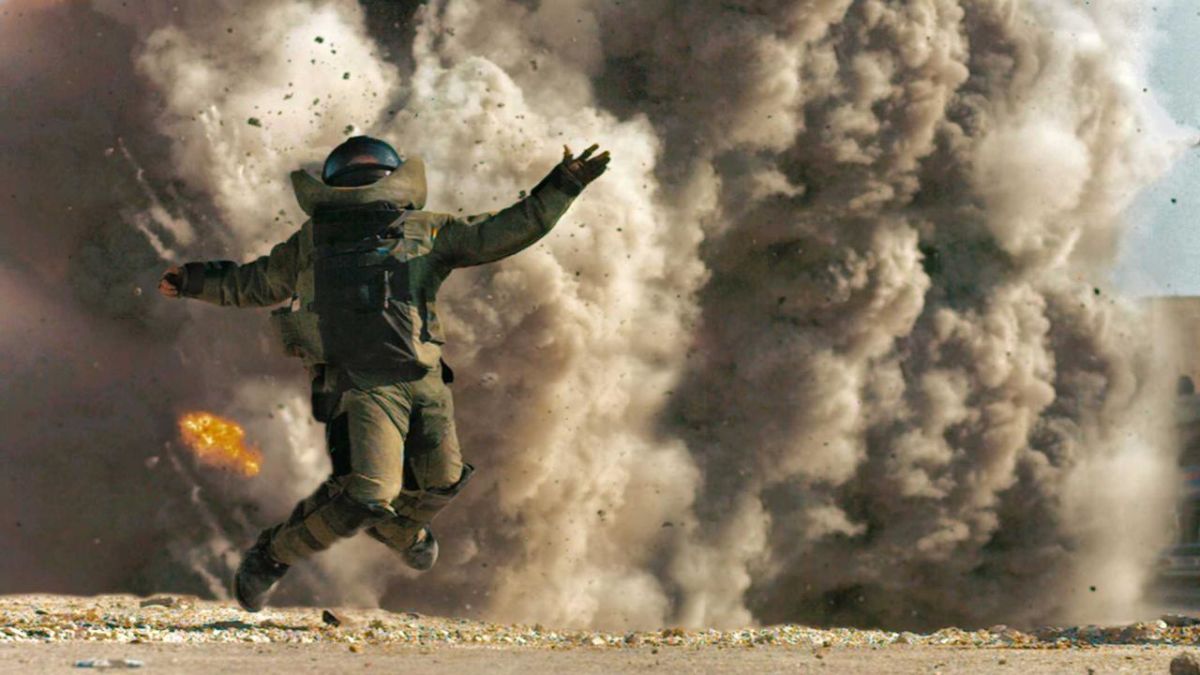
Director: Kathryn Bigelow
Kathryn Bigelow deservedly won an Oscar for directing what I still believe to be one of the best movies about the Iraq War made to date.
Anchored by Jeremy Renner as the leader of an Explosive Ordnance Disposal unit, The Hurt Locker swirls the politics of the greedy and stupid, crazed violence, and palpable tension and uncertainty around Renner’s character. All the while, exploring the machinations of what creates a person who can seemingly only function under the unforgiving circumstances of a potentially endless conflict.
The Hurt Locker has all of that, while simultaneously being one of the best action movies of the 2000s.
Watch if: You want to see a pretty engaging action movie.
Avoid if: You need comprehensive accuracy in your Iraq War movies.
22. Inglourious Basterds (2009)
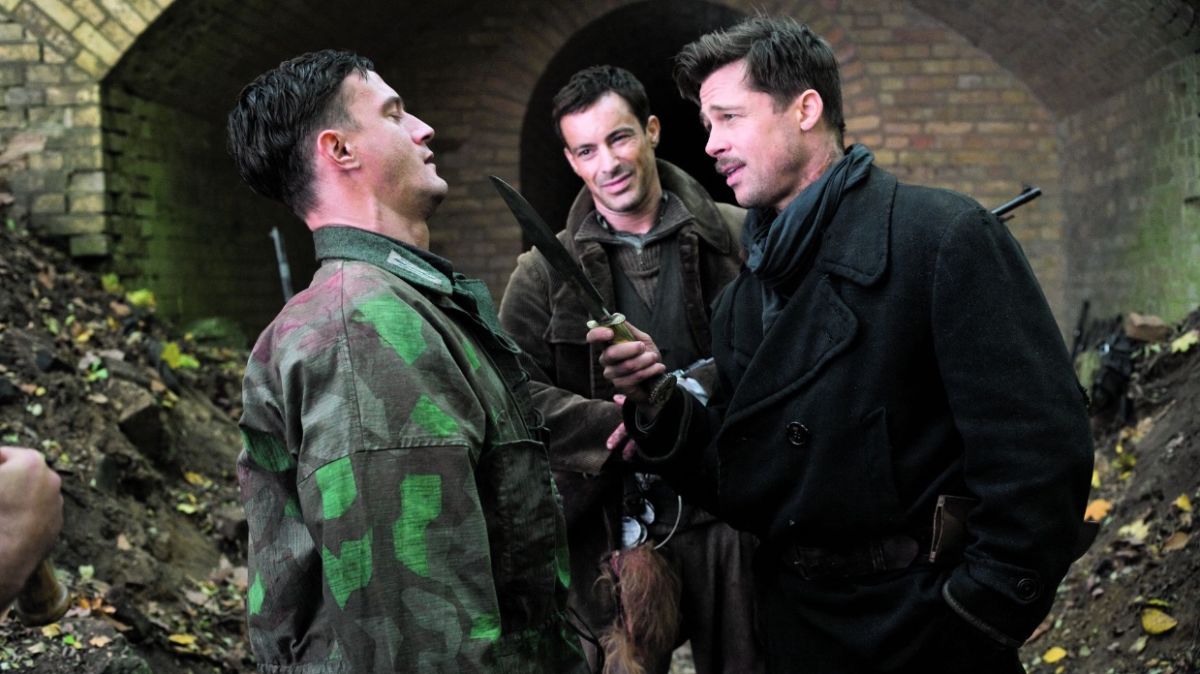
Director: Quentin Tarantino
People who believe in their heart of hearts that every viewpoint, even ones steeped in the vilest forms of bigotry, deserve respect and patience are probably not people who liked Quentin Tarantino’s gleefully savage World War 2 film Inglourious Basterds. This is a film that loves two things above all else. The first is killing as many Nazis as any film has ever attempted to depict on screen, the second is the brutality afforded to our bad guys.
Offhand, it’s difficult to think of a film that has more fun laying waste to Nazis than this movie. That may not work for everyone, or the film’s occasionally bloated running time, but Christoph Waltz is unfathomably terrifying as our primary Nazi monster, and this might be a high point for Brad Pitt, as well.
Inglorious Basterds is pretty savage stuff, but most should find that pretty entertaining.
Watch if: You want to see one of the most visceral war movies of the 21st century.
Avoid if: You’re already not a fan of Tarantino.
23. Lebanon (2009)
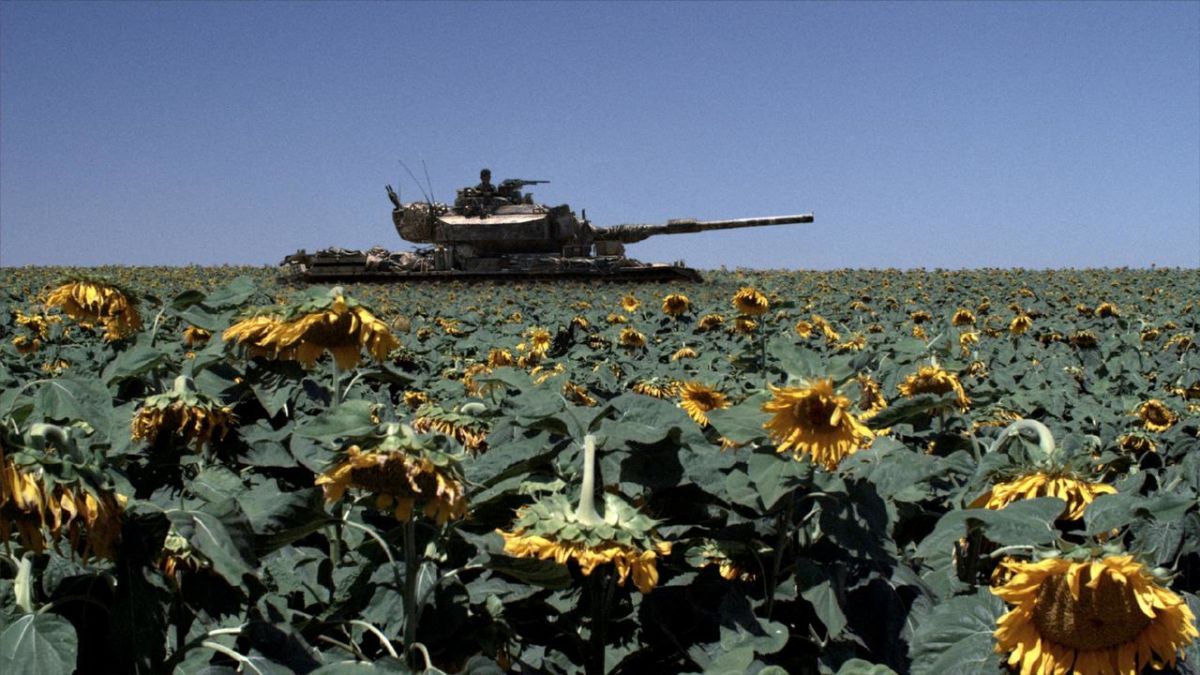
Director: Samuel Maoz
It helps a little to know the basics of the Lebanon War, which occurred in 1982. However, even if you don’t go that far, Lebanon is as riveting as it is unique.
Set inside a tank during the conflict, you can expect that claustrophobia to set in early, building as the movie roars into increasingly dangerous situations. Throughout such an atmosphere, it is inevitable that we learn a great deal about the four Israeli soldiers inside the tank.
While Lebanon is absolutely steeped in the politics of its time, place, and peoples, it is still one of the most stirring anti-war movies made in this decade. It challenges perceptions at a near-constant pace, which is wonderfully exhausting when combined with the nervous energy of the movie itself.
Watch if: You want to see one of the most unique war movies made in recent years.
Avoid if: I suppose it depends on your politics.
24. Beasts of No Nation (2015)
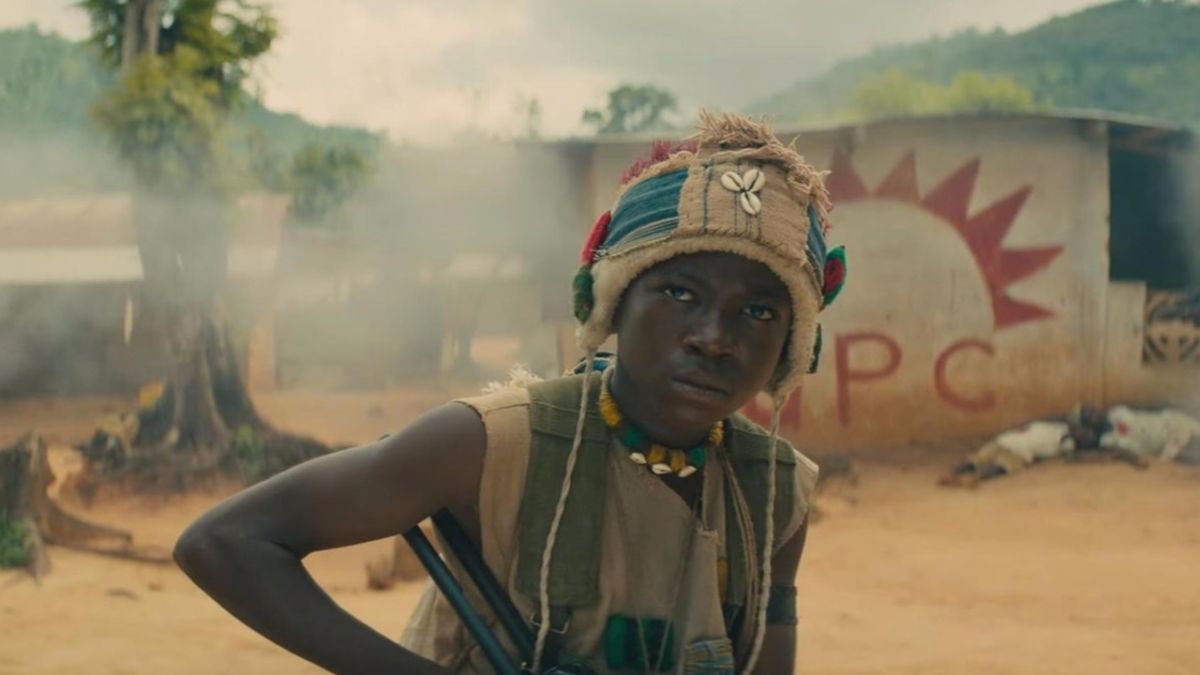
Director: Cary Joji Fukunaga
Set in a West African country (we never learn which one) during a civil war, Beasts of No Nation is not the first in a line of movies about child soldiers.
At the same time, few films defy your expectations of such a story as deftly and profoundly as writer/director Cary Joji Fukunaga does here. It doesn’t hurt that Beasts of No Nation also spotlights amazing performances from Abraham Attah and Idris Elba.
Beasts of No Nation presents its story in a visually provocative way, but there is nothing glorious about the way this film is laid out.
Watch if: You want to see a strong case for Netflix’s legitimacy with their original releases.
Avoid if: You have a weak tolerance for children put through absolute hell.
25. Dunkirk (2017)
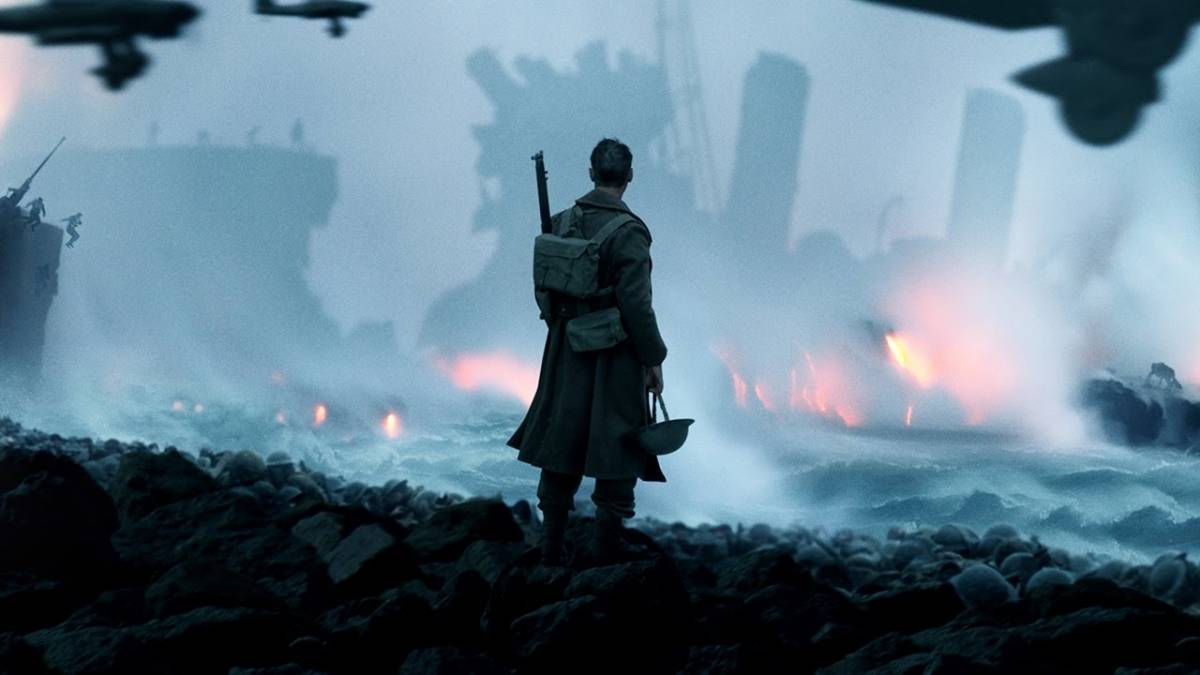
Director: Christopher Nolan
Say what you will about Christopher Nolan. As pretentious as his films can sometimes be/seem, he is also one of the leading innovators of the modern-day epic.
Dunkirk isn’t the first movie about the extraordinary evacuation of some 30,000 Allied soldiers during the Second World War, but it is a masterwork of timing, performance, atmosphere, and attention to detail.
It doesn’t glorify war, as far too many war movies have done. It simply compels one to remember that heroism nonetheless still occurs within situations that ideally wouldn’t happen at all.
Watch if: You want to see a truly awe-inspiring historical reenactment.
Avoid if: You’re over the whole Christopher Nolan thing.
READ NEXT: The Best World War 2 Strategy Games of All Time
Some of the coverage you find on Cultured Vultures contains affiliate links, which provide us with small commissions based on purchases made from visiting our site.
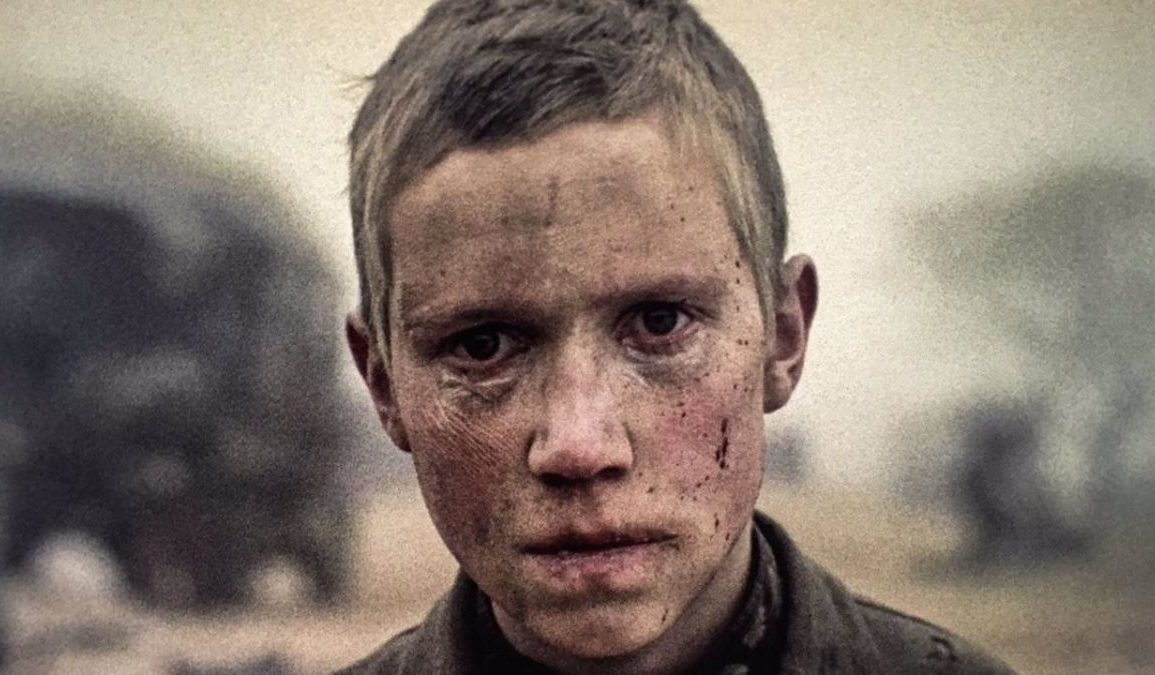

![La Grande Illusion [Blu-ray]](https://m.media-amazon.com/images/I/61jvv5CIVLL._SL75_.jpg)
![Best Years of Our Lives, The [Blu-ray]](https://m.media-amazon.com/images/I/5198rLv3SqS._SL75_.jpg)
![The Bridge on the River Kwai [Blu-ray]](https://m.media-amazon.com/images/I/51cpmi9XpJL._SL75_.jpg)
![Paths of Glory (Blu-ray) (1957) (Masters of Cinema) [UK Import]](https://m.media-amazon.com/images/I/511pKtAHSkL._SL75_.jpg)
![The Battle of Algiers (Dual Format) [Blu-ray]](https://m.media-amazon.com/images/I/61sbYlXUu8L._SL75_.jpg)

![Patton [Blu-ray]](https://m.media-amazon.com/images/I/51nsukLXd0L._SL75_.jpg)
![M*A*S*H [Blu-ray]](https://m.media-amazon.com/images/I/419xiNqkerL._SL75_.jpg)
![The Deer Hunter [Blu-ray]](https://m.media-amazon.com/images/I/514IrXPF0AL._SL75_.jpg)

![Apocalypse Now Final Cut [Blu-ray] [4K UHD]](https://m.media-amazon.com/images/I/51xEkuxMP5L._SL75_.jpg)

![Come and See (The Criterion Collection) [Blu-ray]](https://m.media-amazon.com/images/I/41VnVsfOu5L._SL75_.jpg)
![Platoon (WS/BD) [Blu-ray]](https://m.media-amazon.com/images/I/41+WkrjG14L._SL75_.jpg)
![Good morning, vietnam [Blu-ray] REGION FREE](https://m.media-amazon.com/images/I/51V1coBHB7S._SL75_.jpg)
![Saving Private Ryan [Blu-ray] [4K UHD]](https://m.media-amazon.com/images/I/51BxorL-HbL._SL75_.jpg)
![Black Hawk down [4K UHD + Blu-ray]](https://m.media-amazon.com/images/I/518p5pd5aDL._SL75_.jpg)
![Pan's Labyrinth (The Criterion Collection) [Blu-ray]](https://m.media-amazon.com/images/I/51ZSJ4IZcNL._SL75_.jpg)
![Hurt Locker [Blu-ray]](https://m.media-amazon.com/images/I/61sK3Mud0kL._SL75_.jpg)
![Inglourious Basterds - 4K Ultra HD + Blu-ray + Digital [4K UHD]](https://m.media-amazon.com/images/I/51OwT-uTw0L._SL75_.jpg)
![Lebanon [Blu-ray]](https://m.media-amazon.com/images/I/51uMd93VrhL._SL75_.jpg)
![Beasts of No Nation (The Criterion Collection) [Blu-ray]](https://m.media-amazon.com/images/I/518elYI0czS._SL75_.jpg)

